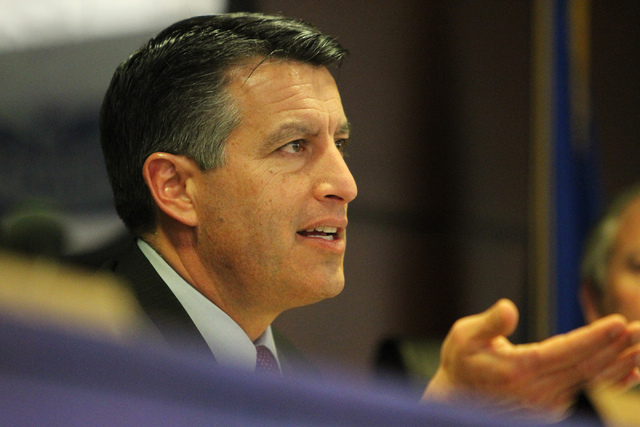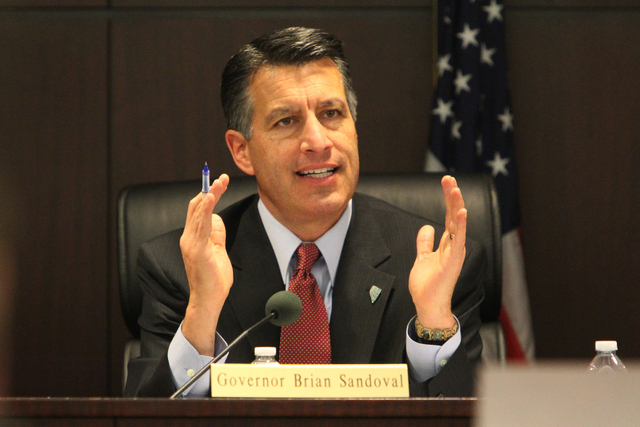Gov. Sandoval details new business fee plan to fund Nevada education reform
CARSON CITY — Gov. Brian Sandoval said Thursday that his proposed business license fee to raise $438 million to fund much of his public education agenda would mean lower tax collections than under myriad other tax proposals debated in Nevada over the past dozen years.
“This is our proposal,” he said. “I am going to defend it.”
The proposed fee, based on gross receipts, encompasses all businesses and is as fair and simple as possible, Sandoval said.
All 330,000 Nevada businesses that now pay a $200 annual flat fee would pay more under the variable-fee plan, but how much more would vary greatly.
The Las Vegas Metro Chamber of Commerce said it is looking forward to studying details of the governor’s plan and working on solutions to Nevada’s revenue volatility.
“The Metro Chamber agrees that significant changes are needed to stabilize Nevada’s tax structure for the long-term economic health of Nevada,” chamber President Kristin McMillan and government affairs committee Chairman Hugh Anderson said in a joint statement.
But the Retail Association of Nevada said the plan mirrors previous gross receipts tax proposals it has historically opposed.
“It has a lot of elements of a gross receipts tax,” said association spokesman Bryan Wachter, adding that it has been “very clear this was a policy we did not agree with.”
He said the group is committed to the governor’s education plan and agrees more revenue is needed to accomplish those goals.
“We hope the Legislature can come to a resolution that helps everyone,” he said.
Individual businesses could be asked to pay from $400 to $4 million per year, but Sandoval said no current businesses would pay the top rate because their gross receipts aren’t high enough to exceed his proposed industry-specific caps.
For the hotel-casino industry, for example, gaming revenues would be exempt while other revenues would be subject to fees of no more than $2.58 million — the most that would be paid in any of the industry categories.
The maximum tax in the construction category would be $405,181.
Those estimates are based on data from 80,000 businesses, and might vary as implemented, said Chris Nielsen, Sandoval’s deputy chief of staff.
Nevada’s business community would be divided into 29 categories based on standard industrial codes, each with a rate based in part on differences in costs and labor rates from industry to industry, Sandoval said. The plan relies on information from Texas to set different industry rates because that state has developed the data over six years and has withstood legal challenges, he said.
Industry differences, for example, would mean a 0.069 percent rate for agriculture while accommodations — hotels — would pay 0.218 percent. Food services, including restaurants, would pay a 0.211 percent rate.
Sandoval, who with his staff briefed the media on the proposal, provided a chart showing the amounts businesses would have paid had previous tax proposals been implemented.
In one example, a construction company with $2 million in gross receipts would pay $1,740 under Sandoval’s proposal.
Under the 2003 gross receipts tax plan, the company would have paid $3,875. Under a 2011 margins tax proposal, the bill would have been $5,600. The Question 3 ballot measure would have generated a $28,000 tax bill. Under a doubling of the modified business tax, which Sandoval said he also considered, the company would pay $5,151.
Other examples show similar results, although some business would pay less if the existing modified business tax were to be doubled.
One example is a retail business with $17 million in gross receipts, which would pay $21,639 under Sandoval’s plan, compared to $11,482 under a doubling of the modified business tax.
While many questions about the proposal remain unanswered, the approach is not unknown in Nevada, Sandoval said. Both the city of Reno and Clark County have a gross receipts component, he said.
“So I think it is important to emphasize and let people know that this is something that is not a novel concept,” he said.
The business license fee is already in law and could be modified to raise the revenue, Sandoval said.
Reform and accountability will be part of any increased funding plan, he said.
Sandoval said his revenue proposal, along with many other tax plans, will be vetted by lawmakers over the next 120 days.
“We’ll let the chips fall where they may,” he said.
Members of the Republican Assembly Caucus offered no immediate endorsement of Sandoval’s revenue plan.
“The process of vetting and approving final budgets takes a great deal of time and careful consideration,” said Majority Leader Paul Anderson, R-Las Vegas. “As we weigh the governor’s recommendations, our caucus will also be offering numerous reforms that will save money and improve education in Nevada. Without these necessary reforms, additional spending alone will not produce the results we all desire.”
Assemblyman Derek Armstrong, R-Las Vegas, who will chair the Taxation Committee, said the details of of the proposal offered by Sandoval will allow his committee to ” begin the task Nevada’s taxpayers have entrusted to us. I welcome Gov. Sandoval’s commitment to Nevada’s future, and I promise to give his proposals the thoughtful consideration they deserve.”
Review-Journal writer Sandra Chereb contributed to this report. Contact Sean Whaley at swhaley@reviewjournal.com or 775-687-3900. Find him on Twitter: @seanw801.

RELATED STORIES
School choice supporters rally at Nevada Capitol
School crowding top issue for district superintendent
CCSD goals align with most of governor’s proposed education plans
Smoking kills, but it also funds education in Nevada
Sandoval’s education improvement plans draw praise, concerns
New year could bring big changes in state
See all of our coverage: 2015 Nevada Legislature.
Proposed business license fee
Effective rates
Industry Type - Industry adjusted rate (percentages)
Agriculture - 0.069
Mining - 0.056
Utilities - 0.148
Construction - 0.091
Manufacturing - 0.099
Wholesale trade - 0.110
Retail trade - 0.121
Air transportation - 0.064
Truck transportation - 0.221
Rail transportation - 0.362
Other transportation - 0.141
Warehousing and storage - 0.139
Publishing, software, data processing - 0.276
Telecommunications - 0.329
Financial activities - 0.121
Real estate - 0.272
Professional services - 0.197
Management of companies - 0.149
Administrative and support services - 0.168
Waste management services - 0.286
Educational services - 0.307
Health services - 0.208
Arts, entertainment and recreation - 0.261
Accommodation - 0.218
Food services (including restaurants) - 0.211
Other services - 0.155
Unclassified - 0.139
Non-employer companies - $400 flat fee
Foreign filers - $400 flat fee


















